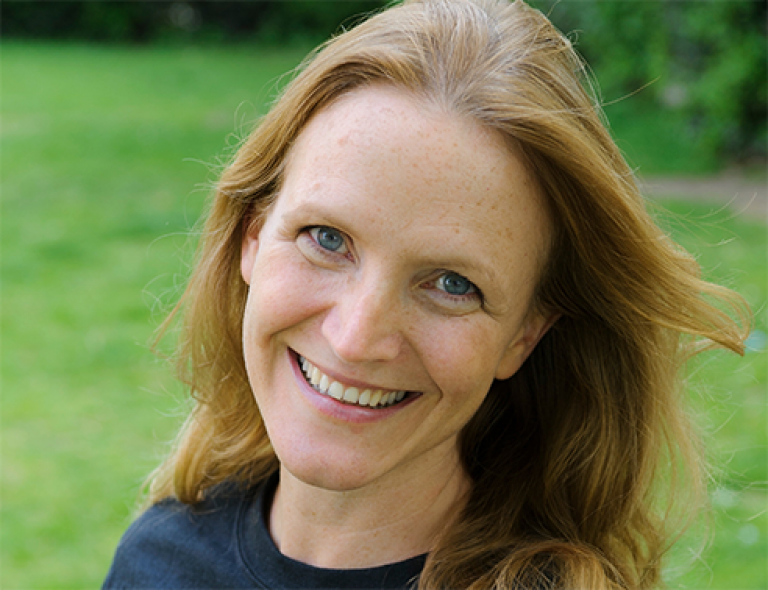Spotlight on Dr Seirian Sumner
18 May 2017
This week the spotlight is on Dr Seirian Sumner, Reader in Behavioural Ecology in UCL Genetics, Evolution & Environment.

What is your role and what does it involve?
I am a Reader in Behavioural Ecology. I am based in the UCL Centre for Biodiversity and Environmental Research (CBER), in UCL Genetics, Evolution & Environment (GEE). I have a particular fondness of wasps…
I lead a research group of PhD students and postdocs in research on the evolution and ecology of sociality, mostly focused on behavioural innovations in social insects (wasps, bees, ants and more wasps). We combine welly boot behavioural ecology (mostly in tropical rainforests) with genomic analyses to gain a genes-eye view of social behaviour, ecology and evolution.
Aside from research, I am Co-founder of Soapbox Science, an initiative that aims to simultaneously promote equality in science and bring science to the masses.
How long have you been at UCL and what was your previous role?
I arrived at UCL in October 2016. I moved from the University of Bristol, where I was a senior lecturer in the School of Biological Sciences
What working achievement or initiative are you most proud of?
I am most proud of Soapbox Science. It's a simple idea: we invite female scientists to stand on wooden crates on busy urban streets and ask them to talk to the public about their science. Unlike most science festivals, Soapbox brings science to the unsuspecting public: over 50% of our audiences are members of the public who didn't intend to learn about science! Uniquely, all our speakers are women - taking part in Soapbox helps raise their public and professional profiles: our speakers say participating in Soapbox has helped boost their confidence, careers, promotions and achieve wider impact. Check out this video from our 2013 event.
Showcasing women sends a strong message about equality in science, and also provides much-needed female role models for the next generation of scientists: a little girl at a recent Soapbox event said she'd "never seen a lady scientist before!". I co-founded Soapbox Science with Dr Nathalie Pettorelli (Zoological Society of London) in 2011: it's expanded from one event a year to 20 in 2017, and now has outposts in four countries around the globe.
This year we will see our 600th female scientist take to her soapbox. Soapbox Science has won awards from the Prime Minister (Points of Light), a Silver Medal from ZSL, and an award from the British Ecological Society for contributions to equality and diversity. It's a huge amount of (un-REF-able) work, but it's worth it to see the positive impact on the public, speakers and local organising teams around the globe. That's why I'm proud of it.
Tell us about a project you are working on now that is top of your to-do list.
Soapbox Science is very much competing for time and space with my research right now: we're starting our 2017 summer festival. We have 250 speakers across 20 cities to train, organise and get on their soapboxes! We have an incredible turnout from UCL this year, with 10 UCL women taking part as speakers, from 9 departments, including three professors: Professor Susan Michie (UCL Health Psychology) Professor Frances Brodsky (UCL Biosciences) and Professor Ijeoma Uchegbu (UCL Pharmacy).
Our first event is in London on 27 May, on the Southbank. Do take a look at the speaker line-up!
The day-to-day running of Soapbox is facilitated by our wonderful Soapbox Coordinator, Isla Watton, who is thankfully a lot more efficient, effective and less flappable than Nathalie and me put together! But apart from the upcoming season of events (which run like clockwork thanks to Isla), at the top of our to-do list is working out how to secure the future of Soapbox, specifically how to make it financially sustainable.
What is your favourite album, film and novel?
Album: I'm a bit old fashioned when it comes to music: Bach's Goldberg Variations, played by Glen Gould is one of my all-time favourites.
Film: Hmm… I haven't really kept a list of favourite films.
Novel: I've just finished reading The Wasp Factory. It's horrific, but has stuck with me… I had to read it because it was about wasps.
What is your favourite joke (pre-watershed)?
Hickory dickory dock
The mouse ran up the clock
The clock struck one…
And the others got away with minor injuries…
(Spike Milligan - cracks me (and my kids) up every time.)
Who would be your dream dinner guests?
Some fabulous women of science:
Barbara McClinock (1902-1992): she was a geneticist who pioneered maize genetics and discovered 'jumping genes', for which she won a Nobel Prize in 1983.
Rachel Carson (1907-1964): conservationist and marine biologist. Wrote the influential book Silent Spring, which described the harmful effects of pesticides on the environment, and spurred on the environmental movement.
Mary Anning (1799-1847): palaeontologist who discovered the first ichthyosaur and plesiosaur skeletons, and played a big role in discovering fossilised poo! Despite her gender and social class, Mary managed to infiltrate the geological societies of her time; however, her contributions were largely forgotten after her death until quite recently.
What advice would you give your younger self?
Learn when to say no (actually, I still can't do that).
What would it surprise people to know about you?
I am the (very mediocre) keyboard player in my village's rock band (no, we don't play any Bach… yet).
What is your favourite place?
Apart from at home with my family? A dark, damp culvert in a Malaysian rainforest, of top-secret location, which is home to the largest super-colony of social wasps anyone has ever seen (probably)… but it's a secret, remember.
 Close
Close

